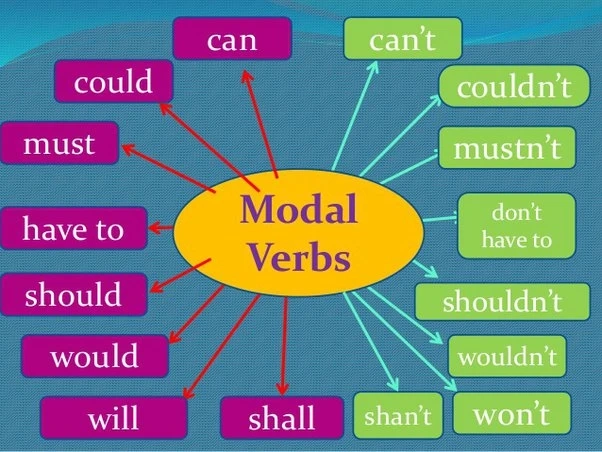Learning all aspects of English grammar will help you not only to expand your knowledge but also to acquire more vocabulary to express yourself in different situations.
Modal verbs are a type of auxiliary verbs that are used to indicate modality, expressing probability, ability, permission, or obligation. These are different from the normal verbs you already know. Let's see some differences:
To these do not add an "s" when speaking in the third person singular
These ask inverted questions, for example: “she can go” → “can she go?”
They are directly followed by another verb in the infinitive
They do not have "to" with the exception of "have to", "ought to" and "be able to"
Let's see the different ways in which modal verbs can be used in English
Can / Could
These two modal auxiliary verbs are used to talk about things that are generally possible, things that you know happen from time to time. "Can" is used to speak in the present and "could" in the past, although it can be used in the present to refer to specific situations.
For example:
Prices can be high in London. (Present)
Prices could be high in the sixteenth century. (last)
He could get arrested. (specific situation in the present)
These can also express skill. In this case “could” we use it in the past tense to talk about general skills, that is, things learned and that you can do whenever you want, such as reading, swimming, among others. The verb "can" is used to refer to general and specific actions, such as things that you can or cannot do in a particular situation.
For example:
She could speak French when she was a child, but now she has forgotten it.
She can speak English. (general)
I can't drive. He's so tired. (specific)
Must
This modal verb can be used to talk about probability, but only when you are totally sure that the action happened, is happening, or is going to happen. This modal verb combined with an infinitive is used to talk about situations in the present and to talk about situations in the past it must be used followed by the auxiliary "have" and the verb in the past participle.
For example
She must be on her way home. (Present)
Julie must have forgotten about the date. (last)
You can also use "must" to talk about obligation, usually based on what a person said. For example:
I must study today.
You mustn't smoke here.
Might / May
It is used when the probability of something happening is not so certain, they would be translated in Spanish as "perhaps". Like the previous modal verbs, they are followed in the present by an infinitive and in the past by the auxiliary "have" and a verb in the past participle.
For example
She might come soon
They may be in the wrong room
She might have worked late
I have may have felt ill
"May" can also be used to ask permission in a formal and respectful way, for example:
May I come in?
May I help?
Should / Shouldn't
These modal verbs are used to make an assumption about something that is likely to happen if everything goes as expected. You can also use it in the past tense, with the auxiliary "have", followed by a past participle verb.
For example:
they should be there by now.
It shouldn't take long to drive here.
The train should have left by now.
This can also be used to advise on things in the present and on past situations, for example:
you should save money.
You should have gone to bed earlier, now you have missed the train.
Will / Would
These verbs can be used to talk about habits or things that you do or usually did in the past. “Will” is used to speak in the present, while “would” is used to speak in the past. For example:
When I lived in Italy, we would often eat in the restaurant next to my flat.
John will always be honest!
Also, you can use "will" to talk about probability in the present, you should use it when you are very sure of something, for example:
She will be at work now
In the English course offered by Wall Street English, you will be able to learn in more detail the use of modal verbs and other aspects of grammar. With our blended learning method, we offer you audio-visual material and constant and personalized support from our native English teachers. Each of the lessons is designed to be developed according to the teaching method based on natural learning, called the natural approach, so you can learn each aspect of the language progressively, making sure you have understood each lesson before continuing.
The combination of both methods gives you the opportunity to practice the language in an interesting and fun way, which will keep you engaged in your learning, something that traditional methods simply cannot offer you.
0



